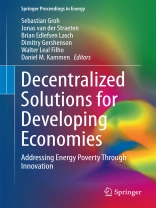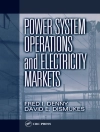The volume presents innovative approaches to improving energy access in underprivileged communities. A core theme is the use of previously underutilized or unrecognized resources that can be found through synergies in supply and value innovation, novel financing methods, and the use of leapfrog technologies. The contributors illustrate how decentralized approaches and small-scale localized solutions can promote climate change mitigation and adaptation and increase the resiliency of vulnerable communities. This book gathers selected articles from the 2014 Micro energy Systems Conference at UC Berkeley that focus on technical, financial, human, institutional, and natural resource capital. The contributions reflect the latest concepts, theories, methods and techniques, offering a valuable resource for researchers, practitioners and governmental institutions engaged in the field of energy access for developing countries.
Tabella dei contenuti
Forewords.- Conference Summary.- Part I: New Experiences, Simulations and Visions from the Field of AC and DC Mini grids.- Part II: Innovations in Value Chains and Financing Schemes.- Part III: Implementation and Decision-Making.
Circa l’autore
Sebastian Groh lives and works in Bangladesh as the director of the companies ME SOLshare Ltd. and ME Fosera Ltd. aiming at energy poverty through latest innovation in rural electrification. Sebastian is further pursuing his Ph D on the role of energy in development processes. Having turned his back on the trading floor, he has been working for the past five year as a consultant to Micro Energy International across the world at the intersection of energy service provision and microfinance.
Jonas van der Straeten is a Ph D student in the Research Group Microenergy Systems at the Technische Universität Berlin, which looks into access to modern energy in the global South from a multidisciplinary and user-focused perspective. His current research focuses on the history of the power sector in East Africa. In parallel Jonas works for Micro Energy International. He has project experience in South East Asia, Central Asia and East Africa.
Brian Edlefsen Lasch is a practicing Solar Engineer based in Berlin, Germany. With the EPC company ib vogt Gmb H, he designs and builds photovoltaic farms worldwide. As a Consultant with Micro Energy International, he advised and implemented rural energy initiatives, including microfinance enabled projects in Mexico, Peru, Bangladesh, Pakistan and the Philippines. He holds degrees in Solar Technology from Technische Universität Berlin and Electrical Engineering from Santa Clara University in California.
Dimitry Gershenson is a Ph D student in the Energy and Resources group at UC Berkeley. His research focuses on energy access finance, investment in emerging markets and business model innovation for decentralized power in East Africa. Dimitry also works as a Renewable Energy and International Development Specialist for Ecoshift Consulting and supports the efforts of the Berkeley Rural Energy Group as an Advisor.
Walter Leal Filho is senior professor at Hamburg University of Applied Sciences (Germany) and holds the Chair of Environment and Technology at Manchester Metropolitan University, UK. Prof. Leal Filho has wide international experience on energy efficiency and renewable energy, having undertaken a set of projects in Latin America, Africa, Caribbean and South Pacific. He holds a number of doctorates for his work on environment and sustainability issues and has in excess of 300 publications to his credit.
Dr. Daniel Kammen is the Class of 1935 Distinguished Professor of Energy at the University of California, Berkeley, with parallel appointments in the Energy and Resources Group, the Goldman School of Public Policy and the department of Nuclear Engineering. He was appointed the first Environment and Climate Partnership for the Americas (ECPA) Fellow by Secretary of State Hilary R. Clinton in April 2010. Kammen is the founding director of the Renewable and Appropriate Energy Laboratory (RAEL).












